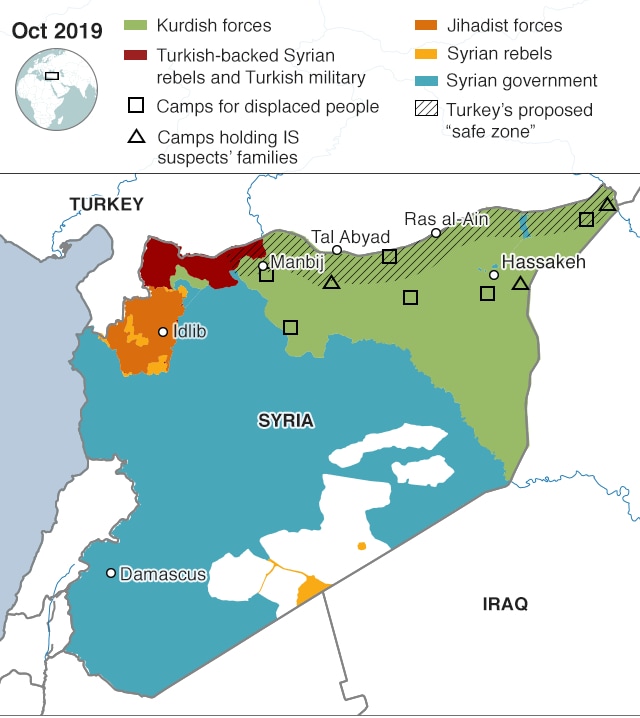Turkey’s Offensive in Syria | 11 Oct 2019
Turkey has launched a military operation called Operation Peace Spring against the Syrian Kurdish militia (YPG) in Northeast Syria just days after U.S. troops pulled back from the area.
- The YPG was the USA’s ally in the war against the Islamic state. However, withdrawal of US troops allowed Turkey to launch the attack.
- Turkey stated that operation was aimed to eliminate “terror corridor” on Turkey’s southern border as well as to create a “safe zone”. Turkey intends to settle millions of refugees in this safe zone who are now in Turkey.
- World powers fear the action could open a new chapter in Syria’s war and worsen the regional turmoil.
- The present chaos could present the Islamic State with an opportunity to stage a revival and worsen the situation in the middle east.
Syria’s Stand
- Syria has considered the attack as “Turkish Aggression” over Syria.
- The Syrian government wants to keep the territorial integrity of Syria intact.
- The Kurdish people have been demanding a separate country for themselves. While, Syria has been rejecting Kurdish demands for autonomy in the region. Syria does not support the rise of federal governments in the country.
- Whereas, Turkey wants to create a buffer between the Syrian Kurdistan and the Turkish border to resettle millions of refugees from Syria. Also, Kurdish people are involved in militant activities in Turkey thus Turkey is reluctant to support Kurdish people present in the region.
Turkey’s Stand
- Turkey considers the Syrian Kurdish militia as an offshoot of the Turkey Workers Party (PKK), the Kurdish militant group in Turkey. Therefore as a threat to the Turkish side.
- Turkey wants to create a buffer between the Syrian Kurdistan and the Turkish border.
- Turkey also plans to resettle some of the 3 million Syrian refugees it hosts in the buffer zone.
India’s Stand
- India issued a strong statement expressing “deep regret” over Turkey’s military action in Syria and called it unilateral and offensive.
- India has called upon Turkey to exercise restraint and to respect the territorial integrity and sovereignty of Syria.
- The diplomatic exchanges between Turkey and India have intensified in recent weeks following India’s decision to end the special status of Kashmir.
- Turkey supported Pakistan’s stance for reversal of the scrapping of Article 370.
Kurds
- The Kurds are one of the indigenous peoples of the Mesopotamian plains and the highlands i.e.current south-eastern Turkey, north-eastern Syria, northern Iraq, north-western Iran and south-western Armenia.
- They form a distinctive community, united through race, culture and language, even though they have no standard dialect.
- They also adhere to a number of different religions and creeds, although the majority are Sunni Muslims.
- In the early 20th Century, many Kurds began to consider the creation of a homeland - generally referred to as "Kurdistan".
- But the boundaries of modern map of middle east made no provision for a Kurdish state and left Kurds with minority status in their respective countries.
- Thus Kurds from Turkey, Iraq, Syria and Iran demands recognition of their tradition, language and homeland state (to be constituted with parts of south-eastern Turkey, north-eastern Syria, northern Iraq, north-western Iran).

